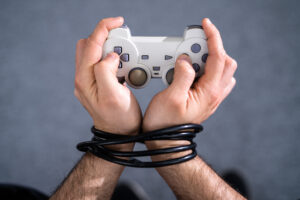By CPL HPG
 Recognizing video game addiction in your child can be challenging but crucial for their well-being. Here are some key signs to watch for:
Recognizing video game addiction in your child can be challenging but crucial for their well-being. Here are some key signs to watch for:
- Behavioral Changes
- Preoccupation: Your child seems constantly obsessed with gaming, talking about it excessively, and thinking about it even when not playing.
- Neglecting Responsibilities: Ignoring chores, homework, or other responsibilities in favor of gaming.
- Loss of Interest: Losing interest in activities they once enjoyed, such as sports, hobbies, or socializing.
- Physical Symptoms
- Sleep Issues: Experiencing irregular sleep patterns, staying up late to play, or being excessively tired during the day.
- Health Problems: Complaints of headaches, eye strain, or repetitive strain injuries from prolonged gaming sessions.
- Neglecting Hygiene: Poor personal hygiene or irregular eating habits due to time spent gaming.
- Emotional Indicators
- Irritability or Anxiety: Becoming irritable, anxious, or aggressive when unable to play or when asked to stop.
- Mood Swings: Displaying sudden mood changes, particularly after playing or when access to games is restricted.
- Social Impact
- Isolation: Preferring to spend time alone gaming rather than with family or friends.
- Declining Academic Performance: Grades dropping, missing assignments, or receiving negative feedback from teachers due to gaming.
- Time Management
- Excessive Playtime: Spending an increasing amount of time gaming, often at the expense of other activities.
- Inability to Reduce Time: Difficulty stopping or reducing gaming time despite wanting to or being asked to.
- Financial Concerns
- Spending Money: Unexplained spending on games or in-game purchases, sometimes without parental permission.
- Deception
- Lying About Gaming: Being dishonest about the amount of time spent playing or attempting to hide gaming activities.
If you observe these signs, it may be time to have a conversation with your child about their gaming habits and consider seeking professional guidance if necessary.